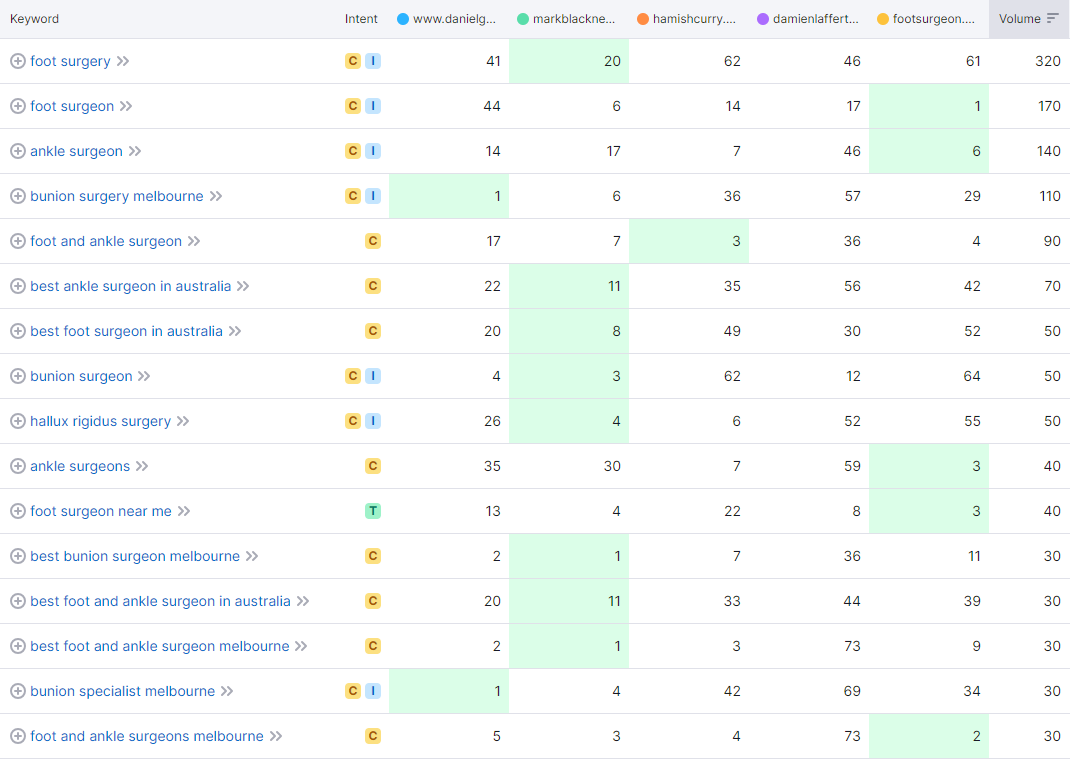
8 Common SEO Questions Clients Ask
Most business owners recognise the importance of SEO, but don’t actually understand what’s involved when it comes to search engine optimisation, and what goes on behind the scenes to secure higher Google rankings.
Here are some of the most common questions our SEO agency gets asked from clients and/or prospects.
1. When can we expect to see results?
This is by far the most common question we get at our Melbourne SEO agency. Unfortunately the answer is “How long is a piece of string?”
There are so many different factors that influence how soon you can expect to see results. These include:
- Your websites’ existing domain authority (how important your site is seen by Google)
- The keywords you choose to target (the more competitive, the longer it can take)
- The current state of your website (including amount and quality of content, technical health)
- Your budget for SEO (the more you invest, the more resources can be used, and the quicker you will see results)
Despite all these influences, we tell people they can usually expect to see meaningful results within 6-12 months. By “meaningful” we are referring to achieving rankings that start generating new leads from organic search. Almost all clients see positive rankings growth within 3 months, even if those keywords aren’t yet generating traffic.
We’ve had clients who have achieved page 1 rankings within a couple of months of starting the campaign, seeing a boost in traffic and enquiries very quickly. It’s important to note that SEO is a gradual process though, and the 6-12 month time frame rings true for the majority of brands. So don’t expect a lot of return from your investment in the initial phase of an SEO campaign. But once you start ranking prominently, the investment really pays off.
2. Can I get first-page rankings?
Much like the previous question, this comes down to a number of factors. What keywords do you want to target? How competitive are they? How strong is your website? What is your monthly budget for SEO?
During our pre-campaign phase, we do initial research that identifies:
- The domain authority of your website.
- The estimated traffic from organic search currently.
- The top keywords driving this traffic.
From this data, together with the types of keyword themes you will likely target, we can get an idea of the resources needed to achieve page 1 rankings. We then recommend a suitable SEO strategy and an estimated time frame to achieve prominent keyword rankings.
We can also go a step further with a comprehensive keyword analysis during the pre-campaign phase. This identifies all the potential themes relevant to your business offerings, and the associated keywords within those themes. We provide data showing how often people are searching for those keywords each month, along with competition levels.
This one-off strategy is a good idea for businesses wanting to know the lay of the land before committing to SEO.
3. How Do We Know If We Are Targeting The Right Keywords?
We perform a comprehensive keyword analysis in month 1 of all our campaigns. (Or during the pre-campaign phase when requested). We work closely with you to verify all your business offerings and then identify all the different words people are using to search in Google for those offerings, in all the locations that are relevant to your brand.
Within this big list, we recommend specific themes and associated keywords. The most lucrative keywords:
- Are highly relevant to your offerings
- Have lots of people searching for them each month
- Have low levels of competition
This is the perfect scenario and is rarely the case, so high relevance, decent search volumes, and manageable competition is a more realistic goal.

4. Our goal is to rank first for “[single-word keyword]” — how can we make that happen?
Targeting a single word keyword is rarely a good move when it comes to SEO. Consider a word such as “lawyer”. For a law firm, it might seem like the logical phrase, which gets a massive amount of monthly searches. However, there are a number of reasons why this isn’t ideal.
The intent of someone searching “lawyer” isn’t unknown.
- What type of lawyer are they looking for? You may not even offer this service.
- What location are they in? They may be on the other side of the country from you.
- Are they even looking for a lawyer, or a definition of the word?
This means the likelihood of them being a suitable prospect for your firm might be 5%. On top of that, the competition levels for a general phrase like this are massive. So, you’d likely need to spend tens of thousands of dollars a month, only to receive traffic to your website that likely won’t convert.
A better phrase might be “family lawyers Frankston”. Our SEO for lawyers can help identify the right keywords. This is one of several niches that we specialise in.
In short, stay away from single-word keywords in most cases.
5. What SEO techniques do you use?
At Temerity Digital, we use a range of techniques for our SEO campaigns. Breaking them down into broad areas, we focus on:
- Keyword Analysis
- Website Audit
- Competitor Review
- On-page Optimisation
- Link Building
- Content
- Conversion optimisation
- Local Optimisation
- Reporting
At the heart of SEO there are 2 key factors; On-page optimisation (what your site is about) and Off-page optimisation (how important your site is). So all our techniques focus on ensuring the website is optimal in terms of keyword usage, quality content, strong internal linking, no technical issues, as well as link building (off-page optimisation) to boost your authority and importance.
These ingredients are the recipe to ranking success.
Our SEO plans now also integrate AI optimisation, to tackle the impact of AI overview on organic traffic, and ensuring your brand is setup to appear in ChatGPT and other LLMs (large language models).
6. How do you communicate your progress?
Since SEO is still a marketing strategy not fully understood by most business owners – especially the nitty gritty of it – we make a big effort to communicate clearly throughout the campaign.
We send a monthly report which includes:
- Work performed last month
- Work scheduled this month
- Rankings movement of all target keywords
- Monthly organic traffic chart
- Number of conversions from organic search
- Breakdown of these conversions
- Other important data
We encourage clients to have a short video call each month to discuss this, ask any questions, and share any news about their business and its direction. We also check in throughout the month with updates on items such as new articles for blog posts, notable ranking improvements, and more.

7. Why do my rankings fluctuate from week to week and why do we go down in rankings some weeks?
It would be fantastic if quality SEO work resulted in rankings continually going up. Unfortunately rankings growth is not linear. Just like the sharemarket, we expect ups and downs. The most important thing is that the long-term trend is positive.
Google takes time to index changes that are made to your site, especially if you have low authority, as they won’t crawl as often to look for new data. So, some content improvements you make today may not be felt in the rankings for a few weeks. Likewise, when building new links back to your website from external sites. It can take time for Google to identify these, thus it can be a month or two before a new link gives you a boost.
On top of this, Google is continually refining their algorithm. There are over 200 factors that influence their search engine rankings, and little tweaks to this can cause your rankings to go up or down. Occasionally they perform a core algorithm update, which causes widespread volatility. When this happens, it is normal to see your rankings fluctuate significantly. This usually calms down after a couple of weeks.
8. What happens if I stop getting SEO services?
SEO should be seen as an integral part of any business’s marketing strategy. It’s ongoing benefits make continual investment a smart move, and ensures your brand gets a regular stream of targeted traffic and leads from organic search.
However, if you do decide to stop SEO, there are a number of things you can expect:
Most obviously, you’ll stop getting reports. This means you’ll no longer have visibility about how your keywords are performing. You’ll still be able to access traffic data in analytics, but it won’t be presented in a clear, graphical way that shows your ongoing progress.
Your rankings and traffic will drop, but not immediately. As mentioned early, it can take time for strategies to have an impact. So after you stop SEO, you will likely still see improvements for the next month or so. But once no new links are built, and no new content created or refined, this improvement will stop, and over time you will see rankings and traffic move lower. The speed at which this happens will depend on the length of time you have been receiving SEO, as well as competition levels for the keywords.
Hence it’s always good to keep an SEO campaign running, to ensure you continually grow your authority, create new content for your site, and make refinements to your site based on algorithm updates from Google.
Share this article
A quick overview of the topics covered in this article.
- 1. When can we expect to see results?
- 2. Can I get first-page rankings?
- 3. How Do We Know If We Are Targeting The Right Keywords?
- 4. Our goal is to rank first for “[single-word keyword]” — how can we make that happen?
- 5. What SEO techniques do you use?
- 6. How do you communicate your progress?
- 7. Why do my rankings fluctuate from week to week and why do we go down in rankings some weeks?
- 8. What happens if I stop getting SEO services?
Latest articles
October 20, 2025
October 20, 2025





